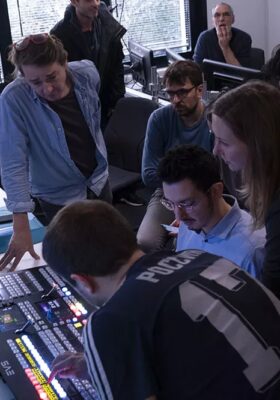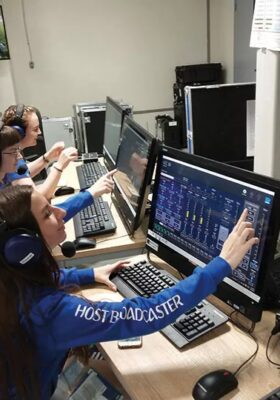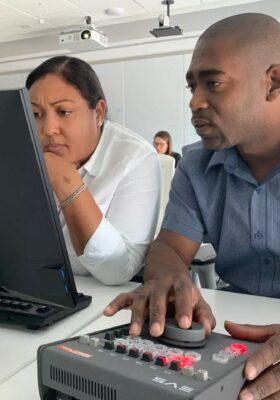Special bursaries are made available for women and under-represented groups to participate in the courses to learn from the best sports directors in the world. Please fill out the form on our ‘Contact’ page to email the Broadcast Academy team regarding potential bursary opportunities.
The Broadcast Academy Mission
Sports directing is still a strong male domain. Although today positive steps have been made, with women directors now raising their profile working on several European football leagues, those successes remain the exception that prove the rule.
The Broadcast Academy offers women and under-represented groups an opportunity to develop their talent in order to encourage a path to becoming top TV directors in the sports broadcast industry.
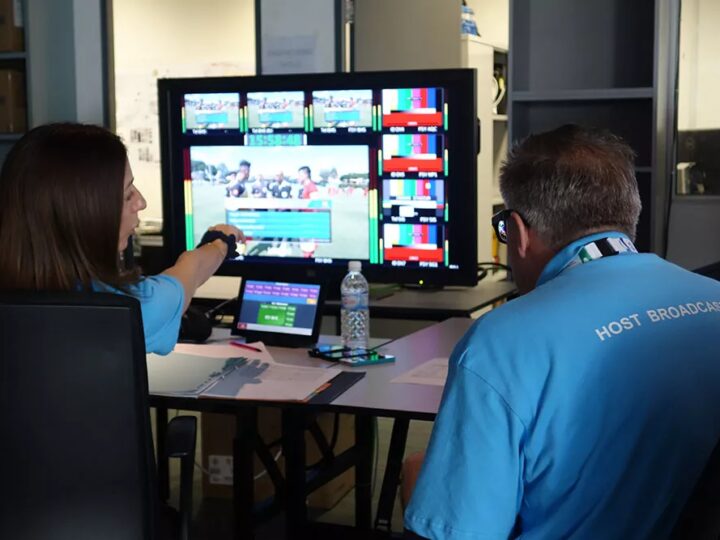
Using the Live TV Simulator, the BA organises weeklong courses in sports directing and have been successful in working with a talented group of women broadcast professionals across England, France, Austria, Iceland and Cameroon.
Since the initiative started in 2016, the impact of the training has been visible in the success of our participants. Vera Bichler, one of the 2018 Academy participant has become the first woman football director at Austrian public broadcaster ORF. Similarly, other Academy participants are making their presence felt in the industry and are inspiring the next generation of women to join the industry.
Unesco
HBS is partnering with UNESCO to bring two new courses to help shape the future of sports broadcasting:
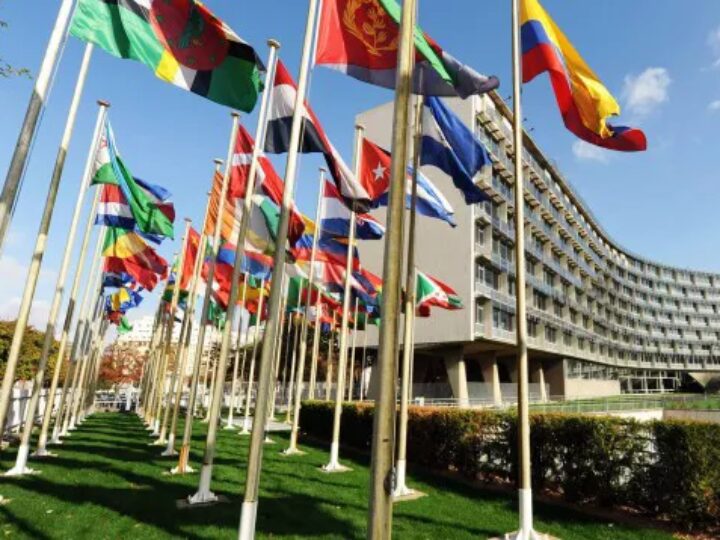
COURSE:
An Introduction to Gender Transformative Sports Broadcasting
This introductory course on gender and sports broadcasting is aimed at production teams, including directors, senior producers and reporters. This is a theoretical course designed to encourage and develop gender transformative policies in content and production of sports broadcasting, considering the business case behind including gender policies in operational activities.
Learning objectives
Theory
By the end of the course, participants will:
- Understand the definition of gender terms in a sports broadcasting context
- Be better equipped to avoid or neutralise stereotypes of masculinity and femininity in sports broadcasting
- Consider ways in which the organisation may implement a procedure of checking for/eliminating gender based stereotypes in its editorial content, commercial messages/advertising
- Understand why gender should be equally represented amongst sources and experts cited, and the need to have a database of contacts of women news sources and women experts
- Consider the business case for gender transformative polices in sports broadcasting
Practical
By the end of the course the participants will be able to:
- Pass on the knowledge gained to their peers, including board members and senior management
- Analyse news articles, photos, comments from a gendered perspective
- Use tools supplied to self-assess their editorial content for gender bias
- Think critically about how women and men are portrayed, particularly in prime time
- Assess to what extent their broadcasts are challenging or reinforcing stereotypes
- Assess to what extent women and men are depicted as making contributions, decisions or victimised in sports broadcasting
Course Duration: 1 day
Maximum Attendee Number: 30
Attendees: Board Members, Senior Management, Directors, Producers, Reporters, Presenters and Journalists.
Note:
This is a joint project between UNESCO and HBS Broadcast Academy to further the aims of the 2030 Agenda and Sustainable Development Goals, specifically relating to gender equality. For media to be most effective in serving their communities, the range of broadcasters, print and online platforms must reflect the diversity and range of opinions of their audiences. This includes ensuring gender equality in sports broadcasting, where women’s voices have declined in recent years. In fact, a report released by the Institute for Diversity and Ethics in Sport at the University of Central Florida and commissioned by the Associated Press Sports Editors gave the industry an F for Gender.[1]
The way to ensure the industry improves on this grade is to have gender transformative actions in sports broadcasting media (including sports media online, in print and content diffused by private and public media) by practicing gender sensitive reporting and editorial decision-making.
In line with UNESCO’s Global Priority Gender, UNESCO is contributing to achieving full gender equality in the media by 2030. The Gender-Sensitive Indicators for Media (GSIM) provide a comprehensive framework for media to analyse their content and operations, and to address the attitudes, behaviour and practices that are obstacles to fairer gender representations. This course adapts the Gender Sensitive Indicators for Media into a sport broadcasting context in order to address gender stereotypes in editorial content.
Course content:
- Short presentation on UNESCO and its action in Gender and the Media
- Understanding of the concept of gender
- What is gender?
- What is gender parity?
- What is gender equality?
- What is gender bias in sports news?
- Overview – the Gender Concept
- The application of gender in and through the media. Definitions, concepts.
- The application of gender through sports broadcasting.
- Introduction to the Gender Sensitive Indicators for Media through sport.
- Workplace Operations
- Content & Portrayals
- Advertising
- How broadcasters can assist in achieving gender equality as part of the Sustainable Development Goals and the 2030 Agenda by ensuring gender sensitivity in editorial content
- Portrayals of femininity in sports in and through the media
- Portrayals of masculinity in sports in and through the media
- Live broadcasting – what to do if the conversation or behaviour is not gender sensitive
- The business case for a gender transformative sports broadcaster
- Women as a share of audience revenue
- The rise of women’s sports
- Developing Actions Plans in your broadcasting organisation to achieve gender equality
- Promoting gender equality in the workplace
- Creating gender transformative policies

